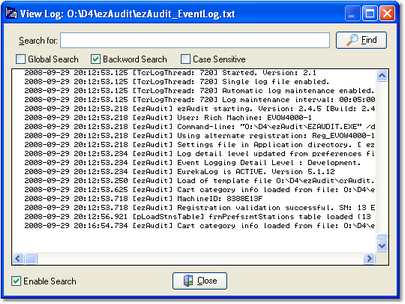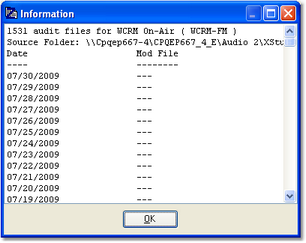You can force ezAudit to increase the detail level as it "tracks" what's happening within the application by setting ezAudit to run in extended event logging mode. The easiest method of increasing the event log detail level is to change your preference settings for event logging, which are located on the Miscellaneous page of the preferences dialog.
Another way to increase the detail level is to add the command-line switch "/debug" (no quotes) to your ezAudit shortcut. For more information on command-line switches, see the topic Command Line Switches.
|
You can temporarily enable or disable additional application logging detail by checking or unchecking the menu item Help | Extended Event Logging. |
Viewing the Application Event Log
When you run ezAudit, actions the program takes, along with actions you take, are recorded to a file in the ezAudit application directory. You can view the file while using ezAudit by selecting Help | TroubleShooting | View Application Event Log, or view it later using a standard text editor like NotePad. The application event logging file name is documented in the topic List of Files. The application event log view is similar to the example shown.
Use the horizontal and vertical scroll bars to navigate the display. Standard [PgUp] and [PgDn] keystrokes work, too. You can search for specific text in this dialog by checking the "Enable Search" item, which reveals a panel for entering the text to search for, setting search direction and other options.
|
When viewing text, you can assign up to 10 temporary bookmarks. To assign a bookmark, use the keystroke combination [Ctrl-Shift] + 0 to 9. A small marker becomes visible in the left margin of the line. To jump to a bookmark, use the keystroke [Ctrl] + 0 to 9. Bookmarks are lost when the dialog is closed. You can also enlarge & reduce the event log text size. Use the plus "+" or minus "-" keys or [Right-Click] to select a text size from the pop-up menu. |
Viewing Available Audit Files for a Station
When the event logging detail level is set to Debug or higher, a small graphic appears on the Open Audit File dialog. [Double-Click] on the graphic to display a list of all audit files found for the selected station. When you view this dialog, its appearance is similar to the example shown.
The information includes a count of audit files, the station to which the log files are assigned, the source path of the files, and a list of of each date for which an audit file exists, sorted in descending order. The Mod File column indicates whether or not a Maestro Voice Tracker modification file, or "mod file" exists for a given date, if applicable.


